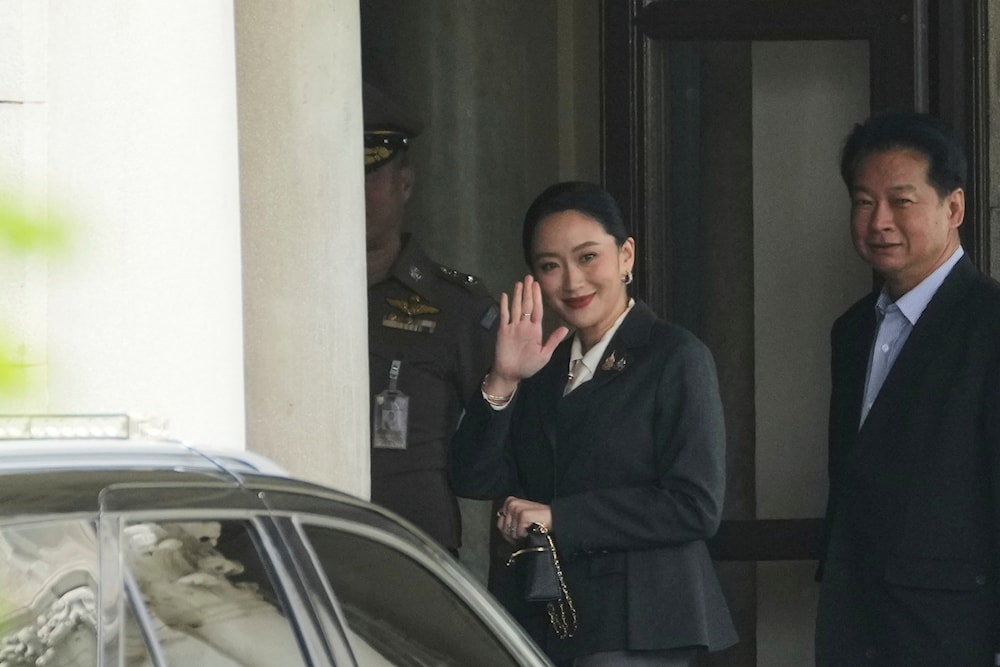Thailand Court to rule on suspended PM after leaked call
Thailand’s constitutional court will decide whether suspended Prime Minister Paetongtarn Shinawatra should be removed from office over a leaked call with Hun Sen.
-

Thailand's suspended Prime Minister Paetongtarn Shinawatra, center, arrives at Government House in Bangkok, Thailand, on August 29, 2025. (AP Photo/Sakchai Lalit)
Thailand’s constitutional court is set to rule on Friday whether suspended Prime Minister Paetongtarn Shinawatra should be permanently removed from office over a leaked phone call with former Cambodian leader Hun Sen. According to reports, the decision could plunge the country deeper into a political crisis and fuel uncertainty about its leadership.
Paetongtarn, Thailand’s youngest prime minister, was suspended last month after the release of a recording in which she discussed a sensitive Thai-Cambodian border dispute with Hun Sen. In the call, she referred to him as "uncle" and pledged to "take care of" any requests he had, while also criticizing a senior Thai military commander.
A group of senators petitioned the court in June, accusing her of breaching ethical standards and undermining national interests. If removed, she would become the fourth member of the Shinawatra family to be forced from office by either military intervention or judicial ruling.
The fallout from the Hun Sen leaked call has shaken Paetongtarn’s government. Critics say her comments demonstrated weakness and compromised Thailand’s position in border negotiations. She later apologized, describing the remarks as part of a negotiation tactic.
The controversy escalated when Hun Sen himself published the full version of the conversation and threatened to reveal damaging information about her father, former Prime Minister Thaksin Shinawatra.
Thai-Cambodian border dispute escalates into conflict
The diplomatic tension spilled over into violence. Weeks after the call was leaked, a simmering border dispute erupted into a five-day conflict, leaving dozens dead and displacing hundreds of thousands. The clash marked a sharp deterioration in Thai-Cambodian relations, worsening public anger toward Paetongtarn’s leadership.
Her government’s fragility deepened when a coalition partner quit in June, leaving her with a slim majority. At the same time, thousands of protesters flooded the streets of Bangkok demanding her resignation, citing both the phone call and her handling of the border crisis.
If removed, Paetongtarn would join her relatives in a long line of Shinawatra leaders ousted from power. Thaksin Shinawatra was overthrown in a military coup in 2006, while his brother-in-law Somchai Wongsawat was removed by a court ruling in 2008. In 2014, Thaksin’s sister Yingluck was forced from office by a court ruling followed by a coup.
The Shinawatra family has been at the center of Thailand’s political battles for decades, locked in a struggle with the military-royalist establishment. Yet its influence is also waning, with recent polls showing declining support among voters.
Friday’s constitutional court decision could determine the immediate trajectory of the country’s politics. Removing Paetongtarn would likely spark another period of instability, as no clear successor has emerged.
Whether she survives or not, the case underscores the enduring rift between Thailand’s populist Shinawatra dynasty and the entrenched establishment, a power struggle that continues to define the nation’s political landscape.

 3 Min Read
3 Min Read










